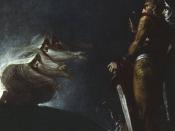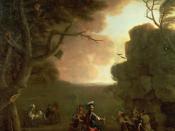William Shakespeare?s Macbeth is clearly a dramatic tragedy, but can the main character truly be referred to as a tragic hero? A tragic hero enters a Shakespearean play as a figure of royalty, fame and/or greatness. However, this person routinely suffers a harsh and dramatic downfall due to flaws in their personality, evil seeds that can be self-produced or planted by others. These flaws are what influence the character?s often heinous actions. Throughout the play, the tragic hero suffers immensely and battles with their conscience even after a specific desire has been reached or accomplished. Even after committing such crimes, the battles with conscience typically trigger sympathy from the audience.
At the beginning of the play Macbeth, the title character already has a modest degree of greatness about him. He has the title ?Thane of Glamis,? and early in the play, he is also granted with ?Thane of Cawdor.? Although this establishes his recognition as an important figure of responsibility, it does not tell the reader much about Macbeth?s personality. However, the Captain praises Macbeth hugely by telling us of his ?bravery.? For example, the captain says, ?For brave Macbeth ? well he deserves that name.? The King also uses the word ?worthy,? which indicates that Macbeth must be worthy of his title and reveals the king?s appreciation of him. At the end of Act 1 Scene 2, Duncan says in reference to the Thane of Cawdor, ?What he hath lost, noble Macbeth hath won,? and indicates that Macbeth is to be granted with the new title. Again, Macbeth is praised and described as noble. We are beginning to see some key attributes of a Shakespearean tragic hero in the man.
Macbeth?s two major personality flaws are rooted in his ambition and impressionability. Ambition is not necessarily a bad thing. Yet in the case of Macbeth, his determination is extremely unhealthy and impossible to stop, leading him to partake in actions that are both wrong and immoral. Macbeth proves that these ambitions exist in Act 1 Scene 4, by saying, ?Let not light see my black and deep desires.? This shows that such evil ambitions do exist, and that the character does not want to showcase these flaws. Macbeth?s most famed ambition is to be King of Scotland, and this personal goal is brought about by way of his impressionism. The witches are supposedly able to predict the future. Early in the play they hail Macbeth as the ?Thane of Cawdor,? before he has been given the title. Macbeth is subsequently granted with that title. The witches also say, ?All hail Macbeth, that shalt be king hereafter.? Macbeth now knows that he will be king and this inevitably increases his ambition and alters his actions throughout the rest of the play. The witches say to Banquo, ?Thou shalt get kings, though thou be none.? This line implies that Banquo?s children will be King, as the word ?get? shows possession.
In reality, the witches are not out to help Macbeth. In Act 3 Scene 5, Hecate, the queen of witchcraft, says, ?As by the strength of their illusion shall draw him on to his confusion.? The witches are aiming to confuse Macbeth. The first line shows us that the witches are aware of Macbeth?s easily influenced mind and are not afraid to take advantage of the fact that he is easily led. The word ?strength? indicates two things: the strength of the witches and the supernatural world as they are able to predict the future as well as performing other supernatural deeds, and the severity of Macbeth?s easily influenced mind which, in the case of Macbeth, is a bad thing.
Once Macbeth has reached the status of King of Scotland, the witches are able to abuse their power over him even more. In Act 4 Scene 1 Macbeth says, ?I conjure you by that which you profess.? Macbeth is completely dependent on the witches and their prophecies. The sisters use this to their advantage and begin to tell Macbeth ?semi-truths.? They say such things as, ?The power of man, for none of woman born shall harm Macbeth,? and, ?Macbeth shall never vanquished be until great Birnam Wood to high Dunsinane hill shall come against him.? Macbeth trusts the witches, and subsequently does not realize that there are mixed and confusing messages in the information they are telling him. They tell Macbeth that no man of woman born can harm him. Macbeth interprets this as meaning that no man can harm him. He overlooks the fact that Macduff, the man who will eventually murder Macbeth, was born through a caesarean section and therefore is not ?of women born.? The sisters also say that he will not be defeated until Birnam Wood moves to Dunsinane hill. Macbeth figures this to be impossible, yet is unpleasantly surprised when the opposing soldiers disguise themselves among the trees and foliage and move up the hill. The witches lured Macbeth into a false sense of security and it backfired on him.
Macbeth?s relationship with the witches is only one example of his excessive impressionism. His wife Lady Macbeth also influences him and persuades him to carry out such acts in order to obtain the title of the King of Scotland. To achieve his specific aim of becoming king, she tells her husband that he must carry out some evil and atrocious deeds such as murder. Macbeth must murder in order to become king. His victims include Duncan, Banquo and Lady Macduff. It is clear that Macbeth is spiraling down an evil path, and this is reiterated by Lennox in Act 3 Scene 6 when he says, ?May soon return to this our suffering country under a hand accursed.? Macbeth will subsequently suffer due to his actions. He realizes that what he is doing is wrong. He proves first in Act 3 Scene 2 when he says, ?Things bad begun, make strong themselves by ill.? Additionally, in Act 3 Scene 4 he remarks, ?We are yet but young in deed.? This last quotation shows the reader that Macbeth is perfectly aware of what he is doing and understands that there are still more murders to be committed. The best quotation for describing Macbeth?s evil is spoken by Malcolm in Act 4 Scene 3 where he says in reference to Macbeth, ?I grant him bloody luxurious, avaricious, false, deceitful, sudden, malicious, smacking of every sin that has a name.? After or while achieving their desire, a tragic hero will battle with their conscience. Macbeth is an excellent example of this and constantly battles with his own inner demons throughout the play. The first example of Macbeth battling with his conscience is within his soliloquy in Act 1 Scene 3: ?Present fears are less than horrible imaginings. My thought, whose murder yet is but fantastical, shakes so my single state of man that function is smothered in surmise, and nothing is, but what is not.? Although Macbeth is ambitious enough to kill the king, he still has a conscience and finds the thought almost revolting in his mind. However, he does not dismiss the idea and is still plotting to kill Duncan, as his ambition is overpowering his conscience. Before the murder of Duncan, Macbeth begins to hallucinate, saying, ?Is this a dagger which I see before me, the handle toward my hand? Come, let me clutch thee: I have thee not, and yet I see thee still.? In Act 3 Scene 4, Macbeth sees the ghost of Banquo, and this again is his mind playing tricks on him. This shows the reader that Macbeth?s remorse is growing and is now on a much larger scale. His conscience is getting the better of him. Lady Macbeth makes strange remarks while hallucinating about blood on her hands. In Act 2 Scene 4, Ross and an old man discuss some strange recent events: ?A falcon tow?ring in her pride of place was by a mousing owl hawked at and killed,? and, ?Duncan?s horses, a thing most strange and certain? tis said they eat each other.? The men are describing the darkness and mystery surrounding Duncan?s death. They talk of owls killing falcons and horses eating each other whilst the sun is obscured. These unnatural events are a result of Macbeth?s evil deeds and are really used to remind the reader of what Macbeth has done.
Although there is no evidence to support the idea, Macbeth definitely receives empathy from the audience. The battles with conscience aid Macbeth in achieving this. Shakespeare is successful in stirring up sympathy from the reader in the case of Macbeth. In Act 5 Scene 9, ?Macbeth is slain.? This fulfils the last part of the description of a Shakespearean tragic hero: the hero dies at the end of the play, and goodness prevails. Macbeth can definitely be described as a Shakespearean tragic hero. The character fulfills the guidelines, most exceptionally as he excels in impressionism and evil. Macbeth is by far one of, if not the best of, Shakespeare?s tragic heros.





